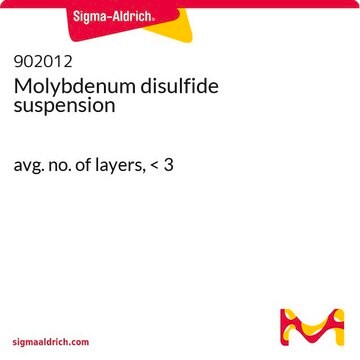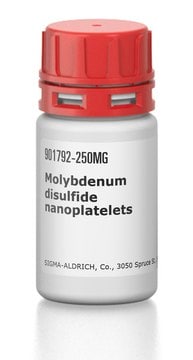900724
Molybdenum disulfide
dispersion, 0.1-0.5 mg/mL in H2O
Synonyme(s) :
2D Dispersion, MoS2 Dispersion nonionic surfactant, MoS2 Dispersion with Pluronic F87, Moly sulfide
About This Item
Produits recommandés
Forme
dispersion
Niveau de qualité
Caractéristiques du produit alternatif plus écologique
Design for Energy Efficiency
Learn more about the Principles of Green Chemistry.
sustainability
Greener Alternative Product
Concentration
0.1-0.5 mg/mL in H2O
Taille des particules
≤500 nm
Point d'ébullition
100 °C (water)
Densité
0.9-1.1 g/mL at 25 °C
Autre catégorie plus écologique
, Enabling
InChI
1S/Mo.2S
Clé InChI
CWQXQMHSOZUFJS-UHFFFAOYSA-N
Description générale
Application
Informations légales
Code de la classe de stockage
10 - Combustible liquids
Classe de danger pour l'eau (WGK)
nwg
Point d'éclair (°F)
No data available
Point d'éclair (°C)
No data available
Faites votre choix parmi les versions les plus récentes :
Déjà en possession de ce produit ?
Retrouvez la documentation relative aux produits que vous avez récemment achetés dans la Bibliothèque de documents.
Les clients ont également consulté
Articles
Recent advancements in paper-based sensing platforms offer cost-effective clinical diagnostics with microfluidic channels and colorimetric or electrochemical detection zones.
Recent advancements in paper-based sensing platforms offer cost-effective clinical diagnostics with microfluidic channels and colorimetric or electrochemical detection zones.
Recent advancements in paper-based sensing platforms offer cost-effective clinical diagnostics with microfluidic channels and colorimetric or electrochemical detection zones.
Recent advancements in paper-based sensing platforms offer cost-effective clinical diagnostics with microfluidic channels and colorimetric or electrochemical detection zones.
Notre équipe de scientifiques dispose d'une expérience dans tous les secteurs de la recherche, notamment en sciences de la vie, science des matériaux, synthèse chimique, chromatographie, analyse et dans de nombreux autres domaines..
Contacter notre Service technique









